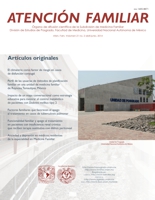Family Functionality and Adherence to Treatment in Chronic Renal Failure Patients Receiving Replacement Therapy with Peritoneal Dialysis
Main Article Content
Abstract
Objective: identify if family functionality and levels of self-esteem have an influence over adherence to treatment in patients with chronic renal failure (crf) who are receiving a replacement therapy with peritoneal dialysis. Material and methods: observational, descriptive, cross-sectional, retrospective and unicentric study, applied to adult patients with crf, in peritoneal dialysis treatment, at the Regional General Hospital no. 36 of Puebla, Puebla, of the Mexican Social Security Institute (imss). It was evaluated the adherence to the treatment with the Morinsky-Green and Batalla testing. Besides, family functionality was evaluated with Familiar Apgar and faces iii; and self-steem with the Scale of Coopersmith. Results: 290 patients were studied, 166 (57.2%) were male and 124 (42.8%) were female. Average age of 51.1 years, media period of time with dialysis peritoneal of 19.8 months, medium of 12, trend of 1 and standard deviation of 23.9, 109 (37.6%) in form of continuous peritoneal dialysis outpatient (cpdo) and 181 (62.4%) automated peritoneal dialysis. The level of education was 106 (36.6%) with primary school completed. There were 207 (71.3%) married, 180 (62.1%) with adherence to the treatment by Morinsky-Green and 165 (56.9%) for Batalla; 149 (51.4%) with medium high average for self-esteem; 227 (78.3%) in functional families (family Apgar) and 133 families (45.9%) in balanced families (faces iii). When looking for the association between family functionality using family Apgar and adherence to treatment by the Morinsky-Green test it was found that the functional families prevailed with adherence to treatment (172; 59.3%); using χ2 by association it was obtained a value of 85.708 with p=2.083. Also the family functionality was associated by using family Apgar and adherence to treatment with the Batalla test, and it was identified prevalence of family functionality with adherence to the treatment (162; 55.9%), with value of χ2 of association of 91.277 with p=1.248. Conclusions: prevalence of adherence to treatment in patients with family functionality and medium high self-esteem level, observing that better family functionality and higher levels of self-esteem more adherence to treatment.
Downloads
Download data is not yet available.
Article Details
How to Cite
Aguilar-Rivera, T., González-López, A. M., & Pérez-Rosete, A. (2015). Family Functionality and Adherence to Treatment in Chronic Renal Failure Patients Receiving Replacement Therapy with Peritoneal Dialysis. Atención Familiar, 21(2). https://doi.org/10.22201/facmed.14058871p.2014.2.47916
